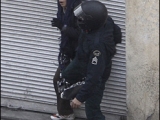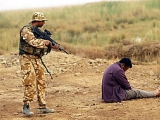Nazanin Armanian
Público.es
Turkey and Syria: Will there be war?
Tayyip Erdogan ha desenvainado la espada. Ya tiene la luz verde del parlamento para atacar a Siria (a espaldas de la ONU), y así darle oficialidad a una guerra no declarada contra este país, empezada hace un año, con injerencias en sus asunto internos, sanciones económicas y acogiendo a su oposición armada. El que el líder turco no suelte lágrimas por los civiles oprimidos a manos de las dictaduras arcaicas de Bahréin, Catar, o Arabia saudí, desmonta la vertiente “moral” de su posición respecto al conflicto sirio.
La situación de Siria se ha estancado. Ni gobierno ni oposición son capaces de derrotarse. Tampoco Rusia ha conseguido un acuerdo de transición controlada con Bashar Al Asad, que al contrario de Mubarak o Ben Ali -que fueron arrancados literalmente de sus sillones por EEUU- es un dictador independiente de las potencias.
Que Washington, en estos momentos, se niegue a una intervención directa en Siria se debe a varios factores: que el conflicto no ha dañado sus intereses ni los de Israel; que la opinión publica en su país no es favorable a una nueva guerra; tiene restricciones presupuestarias; vigila el frágil equilibrio entre sunitas y chiitas en la región (¡en Irak entregó el poder a los chiitas!), por lo que utiliza a Turquía para contener la influencia iraní y también la de los saudíes; teme un aumento del precio del petróleo; que Rusia, Irán y Hezbolá reaccionarían militarmente; que la oposición siria en el exilio aun no es una alternativa a Asad, ni cuenta con el apoyo interno, y que su núcleo central es salafista; quizás sea cierto que hay un acuerdo entre Obama y Putin, según el cual la OTAN no atacaría a Siria, a cambio de que Rusia mantuviera abiertas las rutas del suministro para las tropas de la Alianza en Afganistán desde Pakistán y la Red de Distribución del Norte, que pasa por Kirguizistán; y sobre todo porque Barak Obama, tras los fiascos de Irak y Afganistán, está optando por no implicarse directamente en los conflictos, y las delegue a los drones, los ejércitos aliados, y los mercenarios (empresas privadas de hacer la guerra a la carta), para que le hagan el trabajo a cambio de una trozo del pastel.
La visión simplista de EEUU que reduce los cambios en un país con la expulsión del demonizado jefe del estado en cuestión agrava el panorama. Una intervención militar, aunque derroque a Asad, no pondrá fin al conflicto, sino que sumirá al país en una prolongada guerra interetnica e interconfesional que se extenderá por toda la región.
Eso es justo lo que busca Al Asad, que el coste de su caída para los enemigos sea caro, carísimo. De momento, ha conseguido que Irak pida a Turquía que desmantele varias bases militares que dispone en su región kurda desde 1990, y que la guerrilla kurda del PKK aumentase sus acciones de terror en las ciudades turcas.
La confusión turca
Tayyip Erdogan, agresor que se presenta como víctima, ha sufrido una fatal metamorfosis, resultado de una mezcla de narcisismo, nacionalismo exacerbado y fanatismo religioso, que le han empujado a dar un paso hacia la catástrofe para su país y toda la región.
Todo empezó cuando Asad rechazó sus recetas de reforma para calmar las protestas de marzo de 2011. La herida de su orgullo se enquistó al ver que tampoco los gobiernos nacidos de las llamadas “Primaveras árabes” siguen el tan proclamado modelo turco, ni son afines a Ankara. Además, su protagonismo había sido robado por el presidente egipcio Mohamed Mursi.
Nervioso, no sólo pidió la dimisión del sirio, sino que se volcó con su derrocamiento. Cometió el grave error de pensar que el régimen de Asad solo necesitaba un golpecillo final para desmoronarse. El apoyo que prestaba a los islamistas sirios dieron el resultado contrario: las minorías religiosas y étnicas, así como una parte de la sociedad que temía una dictadura religiosa, se colocaron al margen de las protestas.
Ahora el escenario más temible es el más probable: un prolongado caos y un conflicto sectario a lo largo de los 912 kilómetros que conforman la frontera meridional turca, y una zona kurda en Siria que aumentaría la ventaja del PKK, y que, en caso de unirse con la región autónoma kurda de Irak, harían realidad la peor pesadilla de Ankara: la creación de un estado kurdo. Y eso sin contar la avalancha de refugiados sirios que originarán problemas de recursos y de seguridad.
Erdogan que sufre un frenesí nacional-sunita con un toque de nostalgiasotománicas, fracasa en la principal cuestión de su política exterior que ha sido desbancar a Al Asad, y también en resolver el primer problema del país, la cuestión kurda, que convirtió el 2012 en el año más sangriento en un década en cuanto al número de bajas en ambos bandos.
La guerra dañará sus logros: un crecimiento económico del 8%, una pacífica convivencia entre las minorías religiosas y étnicas, y reducción del poder de los militares. También será un golpe a la seguridad energética turca, que es cliente del gas de Rusia e Irán,
Estamos ante una nueva reconfiguración del tablero de ajedrez de Eurasia y la lucha de las potencias regionales y mundiales para controlar este espacio rico en recursos naturales donde los pueblos son simples peones.
http://blogs.publico.es/puntoyseguido/530/habra-guerra-entre-turquia-y-siria/
***
Nazanin Armanian
Tayyip Erdogan has drawn his sword. He already have the green light from parliament to attack Syria (behind the UN), and to give official status to an undeclared war against Iran, begun a year ago, with interference in its internal matter, economic sanctions and welcoming their armed opposition. The Turkish leader that release no tears for oppressed civilians at the hands of archaic dictatorships of Bahrain, Qatar, and Saudi Arabia, dismantled the shed “moral” of his position on the Syrian conflict.
The situation in Syria has stalled. Neither government nor opposition are capable of defeating. Neither Russia has achieved a controlled transition agreement with Bashar al-Assad, who unlike Mubarak or Ben Ali, who were snatched from their chairs literally US-independent is a dictator powers.
Washington, right now, refuses to direct intervention in Syria is due to several factors: that the conflict has not hurt their interests or those of Israel, that public opinion in their countries is not favorable to a new war has budget constraints; monitors the fragile balance between Sunnis and Shiites in the region (in Iraq handed over power to the Shiites!), so I used to Turkey to contain Iranian influence and that of the Saudis, fears a price increase Oil, Russia, Iran and Hezbollah would react militarily to the Syrian opposition in exile is not yet an alternative to Assad, nor has internal support, and that its core is Salafi, may be true that there is an agreement between Obama and Putin, under which NATO would not attack Syria, in exchange for Russia keep open supply routes for NATO troops in Afghanistan from Pakistan and the Northern Distribution Network, which runs through Kyrgyzstan, and mainly because Barak Obama, after the fiascos of Iraq and Afghanistan, is choosing not directly involved in the conflict, and delegated to the drones, the Allied armies and mercenaries (private companies of warfare à la carte), for you do the work in exchange for a piece of the pie.
The U.S. simplistic view that reduces the changes in a country with the expulsion of the head of state demonized concerned the outlook worsens. Military intervention, even overthrow Assad will not end the conflict, but that will plunge the country into a prolonged and inter-ethnic war that will spread throughout the region.
That’s just what you are looking for Al Asad, the cost of your enemies fall to be expensive, very expensive. So far, Iraq has made ask Turkey to dismantle several military bases in Kurdish region has since 1990, and that the PKK Kurdish guerrillas increase its share of terror in Turkish cities.
Turkish Confusion
Tayyip Erdogan presented aggressor as victim, has undergone a metamorphosis fatal result of a mixture of narcissism, extreme nationalism and religious fanaticism, have pushed him to step into the disaster for their country and the region.
It all started when Asad rejected reform prescriptions to calm the protests of March 2011. The wound of his pride at seeing enquistó governments nor born-called “Arab Spring” as proclaimed follow the Turkish model, nor are they related to Ankara. Moreover, their role had been stolen by Egyptian President Mohamed Mursi.
Nervous, not only called for the resignation of Syrian, but rolled his overthrow. He made the mistake of thinking that the Assad regime end just needed a nod to crumble. The support provided to the Islamists Syrians gave the opposite result: religious and ethnic minorities, as well as a part of society that he feared a religious dictatorship, were placed outside the protests.
Now the most frightening scenario is more likely: a prolonged chaos and sectarian conflict along the 912 kilometers that make up the southern border Turkish and Kurdish in Syria would increase the advantage of the PKK, and that, if join the autonomous Kurdish region of Iraq, would actually Ankara’s worst nightmare: the creation of a Kurdish state. Not to mention the flood of Syrian refugees who originate problems and security resources.
Erdogan suffering a national frenzy-Sunni with a touch of nostalgia otománicas fails in the main foreign policy issue that has been oust Assad, and also to solve the first problem of the country, the Kurdish issue, which became the 2012 in the bloodiest year in a decade in the number of casualties on both sides.
The war damage his achievements: economic growth of 8%, a peaceful coexistence between religious and ethnic minorities, and reducing the power of the military. It will also be a blow to the Turkish energy security, which is a client of gas from Russia and Iran,
Is this a new reconfiguration chessboard of Eurasia and the struggle of regional and global powers to control this resource-rich area where people are mere pawns.



